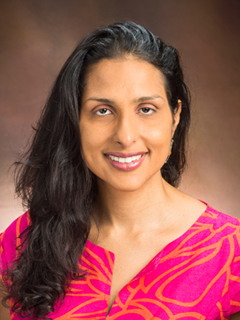HOW CAN WE HELP YOU? Call 1-800-TRY-CHOP
In This Section
Community at Center of Rare Disease Research for TBCK Syndrome

The TBCK Foundation hosted the 2023 TBCK Conference, where physician-scientist Dr. Xilma Ortiz-Gonzalez shared new research and listened to families speak about their experiences with the disease.
Out of the approximately 100 confirmed cases of TBCK syndrome in children worldwide, over 30 of those patients have traveled to receive medical care at Children's Hospital of Philadelphia. Their rapport with attending physician Xilma Ortiz-Gonzalez, MD, PhD, who co-discovered the rare, progressive, and fatal neurodegenerative disorder, is crucial for patients and their families, many of whom joined her and other CHOP clinicians and researchers for a virtual conference in October.
"Clinically, I'm drawn to rare disorders because I want to solve the mystery," said Dr. Ortiz-Gonzalez, who also is an assistant professor of Pediatrics and Neurology at the Perelman School of Medicine at the University of Pennsylvania. "But there is also a personal component, too, because many patients affected with TBCK are Puerto Rican. They're in my clinic because I can speak Spanish and maintain a trusting relationship with them."
In 2016, Dr. Ortiz-Gonzalez, fellow CHOP physician-scientist Elizabeth Bhoj, MD, and a group international researchers described TBCK syndrome for the first time and identified its cause as variants in the gene encoding in the TBC1-domain-containing kinase (TBCK). Although symptoms and conditions may vary from patient to patient, common symptoms include developmental delays, neuromuscular weakness, epilepsy, and craniofacial dysmorphia.
Because there are so few patients, little is known about this disease, and families often feel alone as they begin their journey from diagnosis onward. These challenges created a need for community, which manifested as the TBCK Foundation, established in 2019.
The Foundation hosted their annual virtual conference Oct. 14, which was simultaneously interpreted into both Spanish and English. Families, especially those with older children who have already gone through diagnoses and various management strategies, shared their knowledge and experiences to help families with younger children new to this disease.
As a guest speaker, Dr. Ortiz-Gonzalez shared plans for a new basic science study supported by a grant from the National Institute of Neurological Disorders and Strokes (NINDS). She and colleagues will study how TBCK-deficiency affects mitochondrial function and neurodegeneration using human induced pluripotent stem cell-derived neurons.
Currently, TBCK's mechanistic role in neurodegeneration remains incompletely understood, but the Ortiz-Gonzalez lab is working in understanding the link between TBCK-deficiency and selective neuronal vulnerability — or why neurons are predominantly affected in neurodegenerative diseases. Previous studies suggest that the TBCK protein may be involved in messenger RNA transport, and the newly funded NINDS grant will allow researchers in Dr Ortiz-Gonzalez's lab to explore what happens to RNA transport and local protein translation when the TBCK protein is missing.
"This disease primarily affects the nervous system," Dr. Ortiz-Gonzalez explained. "Our goal is to learn why that is and what is special about neurons that makes them particularly need TBCK. If you think about Alzheimer's and Parkinson's and similar neurologic diseases, despite mutations or variants that people carry, neurons still seem to be the most affected. Although TBCK syndrome is a very rare disease, I think these concepts could prove relevant to other diseases that are not as rare and help even more people."
Conference participants also had the option to participate in a natural history study led by Dr. Ortiz-Gonzalez and other collaborators at CHOP to form a better understanding of the disease trajectory, with the long-term goal of establishing a baseline to determine if targeted therapy interventions are effective.
"In the rare disease world, we've seen that new therapies can be challenging to bring to clinic because trials do not always meet endpoints or outcomes measures," Dr. Ortiz-Gonzalez said. "We want to start thinking ahead by collecting all the clinical data we can from patients, which is only possible with direct participation from the families. We truly could not do this without them, and this is a nice way for families to contribute to move the field forward."
